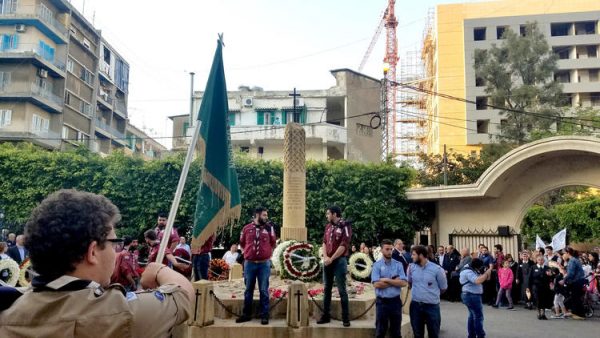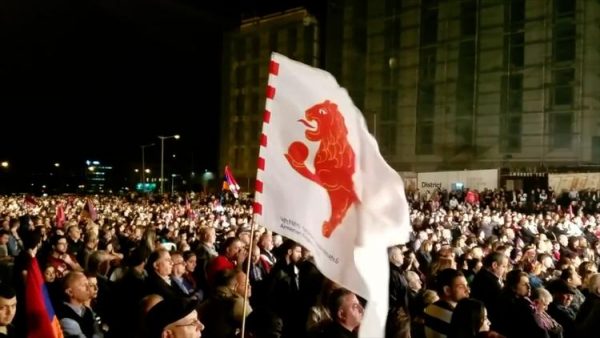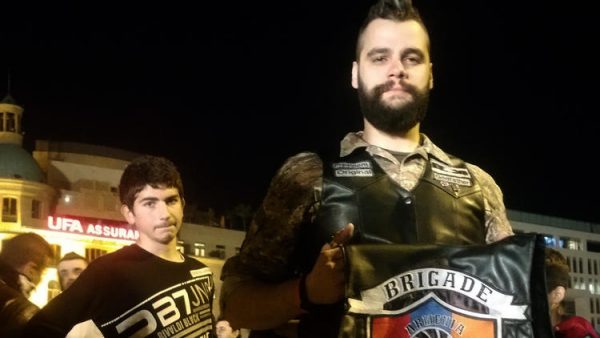
Beirut, Lebanon- The thump of the bass drum reverberated through the neighborhood.
It was the cue for the dozens of young scouts in two-tone uniforms to take their positions in a procession through Beirut’s Christian quarter to the Patriarchate of the Armenian Catholic Church.
The solemn march Monday afternoon marked the 102nd anniversary of the start of the Armenian genocide, which began in 1915 and resulted in the deaths of as many as 1.5 million Armenians.
Turkey has long disputed that a genocide took place, arguing that the killings can’t be separated from the historical context of global upheaval during World War I, and that many Turks also were killed. But most historians outside Turkey describe an orchestrated effort of ethnic cleansing by the Ottoman Turkish government that meets the definition of genocide.
Once the procession reached the church, the scouts set wreaths of red and white flowers around an ornate column topped by a cross that stood at the center of a courtyard as a monument to the genocide.
Commemorating the 102nd anniversary of the Armenian Genocide, dedicated to Gomidas (by ARF Lebanon)
Nearby, a few of the hardier boys raised poles with the Armenian blue, orange and red flag fluttering alongside Lebanon’s flag. Some of their classmates’ faces turned a shade of scarlet as they blew trumpets raised to the sky.
“Wherever there are Armenians, there will be this ceremony.… It’s a duty. They come to show respect and appreciation,” said Aram Karadaghlian, 31, one of the event’s organizers.
The stick on his jacket lapel featured an infinity sign around the number 102 underlined by a phrase in elegant Armenian script which declared: “On the verge of the new century, but with the same commitment as the previous one.”
It was a reference to the continuing struggle to keep the memory of the genocide alive, he said. “It’s about remembrance, because we don’t forget.”

His sentiment was echoed by Mehran Najarian, a 44-year old businessman who had brought his family to the ceremony.
“In this country we have the privilege to be able to express ourselves,” he said. “Each community does this here.”
“I’m the third generation of Armenians here. And as you can see the fourth is standing in front of you,” he said, turning to his 10-year-old son, Sarkis.
Although there were commemorations for this event all over the world, said Samvel Mkrtchyan, Armenia’s ambassador to Lebanon, “the Armenian community in Lebanon is the most important.”
Lebanon’s more than 100,000 Armenians “are the descendants of those who perished in the beginning of the 20th century,” he said.
“Those orphans and impoverished families found refuge in Lebanon and they grew from the ashes and rebuilt their lives and became one its most important communities.”
Later, as night fell on the city, thousands descended on the downtown district to Martyrs’ Square, which had been named to remember Lebanese who had been executed there during Ottoman rule in 1931.
Rows of plastic chairs had been laid out before a stage ringed by powerful lights and a large screen displaying “100+2.”
Looking on were a dozen or so leather-clad members of the Armenian Brigade Motorcycle Club.

“Today it’s a duty on every Armenian to join this event for the recognition for the Armenian genocide,” said the leader of the club, Danny Dervishian, whose nickname, “The Godfather,” was stitched on his vest
Lebanese Armenian officials and politicians addressed the crowd.
One official, Annie Yepremian, gave a defiant speech in Armenian remarking on the global nature of the proceedings.
The anniversary was being marked “from Beirut to Paris, from Aleppo to New York, from Tehran to London,” said Yepremian.
A representative of Michel Aoun, the country’s newly appointed president, described the day as both “sad and brilliant.”
“It is sad because of the genocide against an alive, great, free people, the Armenians of Lebanon and the world,” he said.
But it was brilliant because of the achievements of the Lebanese Armenians in the country.
“A salute from the president,” he told the crowd to polite applause.
LA TIMES

Leave a Reply
You must be logged in to post a comment.